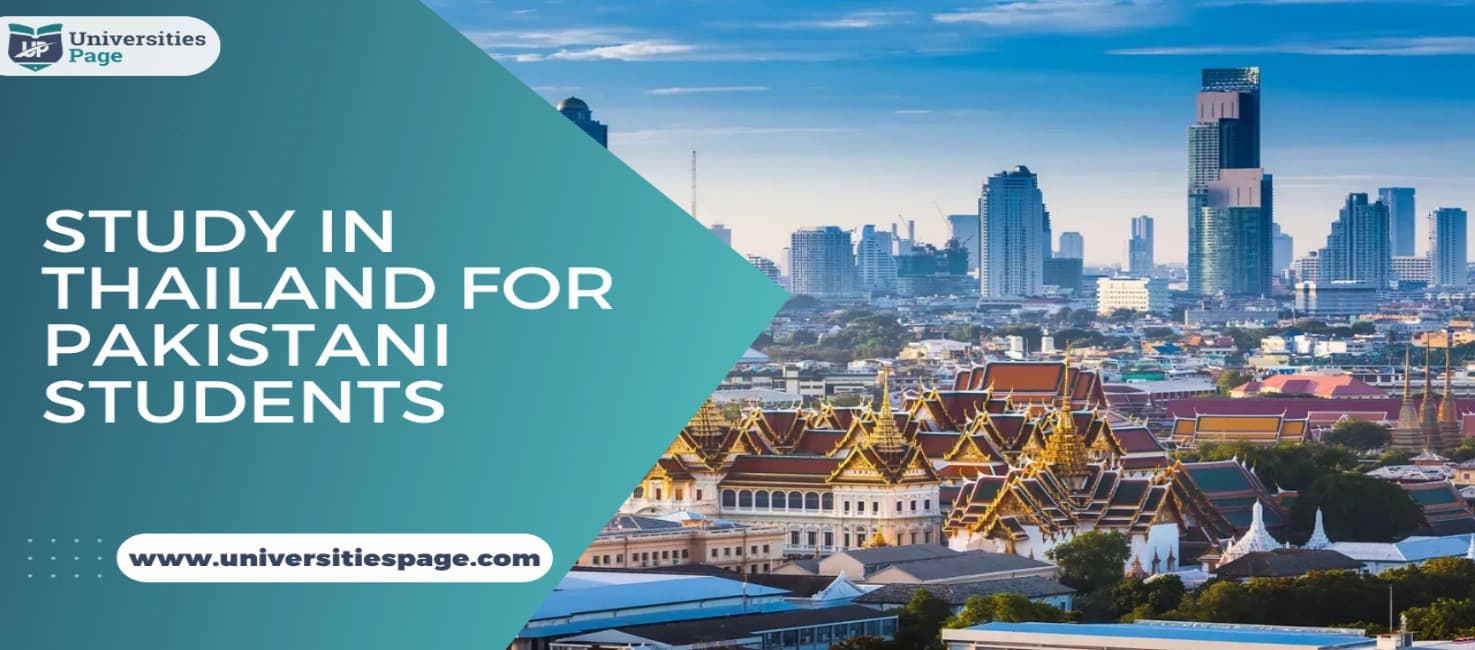Loading article...
Preparing your reading experience
Loading article...
Preparing your reading experience

Studying in Thailand is the best choice for students because it provides a rich culture of tradition and modernism with a central location in Southeast Asia. With the most friendly and hospitable Thai people, Thailand welcomes about 20,000 international students annually. The official language spoken in Thailand is Thai, but 60-70 percent of people can also speak English. The official currency used in Thailand is Thai Baht (THB).
There are currently 123 universities in Thailand, out of which 42 are private institutions offering admission to various programs like business management, computer sciences, engineering, and medicine. Many partially and fully funded scholarships are available for international students at the universities of Thailand. The average tuition fee to study in Thailand is 1600-6500 euros, but it varies depending on the program you are studying and the university you are enrolled in.
IELTS is mandatory for admission to Thailand, but you can check out very few universities that offer admission to study in Thailand without IELTS. Part-time work in Thailand is legally prohibited unless you are enrolled in a study work program or paid internship. The bank statement to study in Thailand should not be less than 4000$. Studying in Thailand is quite affordable, with an average monthly expense of 350-700 euros. The visa acceptance rate for studying in Thailand is 80%.
|
Key Information
Study in Thailand |
|
|
Teaching language |
English, Thai
Language |
|
Country |
Thailand |
|
Top Universities |
|
|
Course duration |
|
|
Eligibility |
Higher school
certificate for bachelors A Bachelor’s degree
for masters A master's degree
for PhD |
|
Average tuition fee |
|
|
IELTS Requirement |
Yes (But some
universities offer admission without IELTS) |
|
Entry Test |
IELTS, TOEFL
depending on the universities |
|
Scholarships |
Available (Both
partially and fully funded) |
|
IELTS Requirement |
Yes (But some
universities offer admission without IELTS) |
|
Entry Test |
IELTS, TOEFL
depending on the universities |
|
Scholarships |
Available (Both
partially and fully funded) |
|
Part-time working
hours |
You cannot work
part-time while studying except for paid internship and study work programs
offered by a few universities |
|
After study work, a
Permit |
You must apply for
non-Immigrant B visa for a work permit |
|
Embassy |
Plot No 1 Diplomatic
enclave 1 Sector G, 5/4 Islamabad |
|
Bank Statement |
No less than 4000 $ |
|
Average Monthly
expense |
350-700 euros per
month |
|
Admission Process |
15-45 Days |
|
Visa Processing Time |
3-5 weeks |
|
Visa Acceptance rate |
80 % |
Studying in Thailand is full of adventures and benefits
related to education and entertainment. Here are some reasons why you should
consider Thailand for study;
Affordable Tuition Fees: Thailand's universities are
cost-effective in terms of tuition fees compared to other Asian countries that
provide quality education. They charge an average of 1600-6500 euros per
year, depending on the program.
Quality Education and Global Acceptance: Universities
like Chulalongkorn University, Mahidol University, and Thammasat
University are being accepted around the world for their academic courses
in engineering, medicine, business, and social sciences.
English-medium programs: The number of English-medium
programs offered in the country has increased tenfold, especially for business
administration, international relations, hospitality management, and
engineering.
Cultural Immersion: Students in Thailand are not only
exposed to Thailand's rich cultural heritage, such as its Buddhist temples
and Thai cuisine, but they also become part of a dynamic international
community.
Low Cost of Living: Thailand is also one of the most
affordable countries for international students compared to other well-known
student destinations. Bangkok and Chiang Mai are both huge
student cities, with accommodation ranging from shared flats to university
dormitories at very reasonable prices.
Safe and Welcoming Environment: Thailand is one of the safest nations in Southeast Asia, with minimal crimes, especially in student-infested cities such as Bangkok, Chiang Mai, and Phuket. Thailand is also known as Land of Smiles for its culture of hospitality.
Beautiful climate: Tropical climate means warm weather all year round, so everyone who loves outdoor activities seems to flock here. Students have a chance to visit Thailand's spectacular beaches, such as Phuket, Krabi, and Koh Samui.
Research and Learning Opportunities: Thailand's profile is rising across various academic and research streams as the country steadily becomes a leader in many specific fields, such as sustainable development, renewable energy, tropical medicine, and agricultural sciences.
The best scholarships in Thailand are offered by both Thailand Government
and universities. Some top Scholarships in Thailand are listed here:
Related:
The Royal Thai Government Scholarships provide a golden
opportunity for international students to pursue master's and PhD
degrees at the Asian Institute of Science and Technology in
Thailand. The scholarship is merit-based and fully funded,
including tuition fees, registration fees, accommodation, and living stipends
for the entire duration of the course. It is open to students from Bhutan,
Timor-Leste, ASEAN countries, and other Asian countries. Applicants need to
prove academic excellence with at least a 3.5 CGPA, present two letters
of recommendation, submit a research proposal, and have an IELTS
score of 6.0.
Chulalongkorn University of Thailand offers fully funded
scholarships for master's and PhD programs. A fully competitive
financial package is endowed to students pursuing or undertaking their degree
studies. Eligible candidates must hold a bachelor's or master's degree to
qualify for this scholarship, with a minimum GPA of 2.75 for a
bachelor's degree holder and 3.25 for a master's degree holder.
Proof of English proficiency, such as IELTS or TOEFL, is also mandatory.
The candidate must also be less than 40 years of age and in good health.
Mahidol University offers two types of postgraduate
scholarships for international students pursuing master's and PhD degrees.
The Type 1 Scholarship is fully funded: it covers tuition,
research, and living allowances. The Type 2 Scholarship is partially
funded: the recipient earns a 50% tuition fee, research, and other
expenses coverage. These scholarships are mainly given to attract students with
excellent academic records and English-speaking proficiency (IELTS, TOEFL).
The PSU (Prince of Songkla University) offers scholarships to international students who pursue master's and PhD degrees in medicine. These scholarships cover two years of the master's program and three years of the PhD program. The requirement for this scholarship award in Thailand is that the candidate be an incoming graduate or doctorate student at PSU. Eligible candidates must have excellent academic records, conducted research, and English language proficiency.
The TICA administration offers the Thailand International
Postgraduate Programme (TIPP) for international students who want to take
graduate programs in Thailand. To apply for this scholarship in Thailand, you
must be nominated by the National Focal Point for International Development
Cooperation from the participating countries. Generally, they will ask for
previous academic transcripts, medical records, and recommendation letters to
qualify for this scholarship. Eligible candidates for this scholarship are
master's degree holders.
Related:
Based on the academic excellence, international recognition,
and research contributions. Here is the list of some top universities in
Thailand:
|
World Ranking |
395 |
|
IELTS Requirement |
Yes (6 Band) |
|
Average tuition fee |
2000-8000 euros/year |
|
Acceptance rate |
53 % average
calculated The university
Didn't provided any data |
Mahidol University, established in 1888 as the country's first medical school, is a public research institution with a specific focus on health sciences. It receives the largest research budget in the country, around USD$147 million annually. It is the world's 395th top-ranked university, with an average tuition fee of 2000-8000 euros per year. The minimum IELTS score required for Mahidol University is 6.0.
|
World Ranking |
603 |
|
IELTS Requirement |
Yes (6 Band) |
|
Average tuition fee |
2000-6000 euros/year |
|
Acceptance rate |
56 % |
Chulalongkorn University established in 1917 by King
Vajiravudh, is located in the heart of Bangkok. Enrolling 38,900
students out of which 25,700 are undergraduates this university
specializes in engineering disciplines, modern languages, chemistry, biological
sciences, pharmacy, and medicine. The average tuition fee for Chulalongkorn
University ranges between 2000-6000 euros per year. An IELTS score of
6 is required, while the acceptance rate calculated is approximately
56%.
|
World Ranking |
894 |
|
IELTS Requirement |
Yes (6 Band) |
|
Average tuition fee |
600-2000 euros/year |
|
Acceptance rate |
70 % |
Chiang Mai University is considered Thailand's best institution, and it is located outside the capital. The public research institution was established in 1964 and was the very first higher education institution in Northern Thailand. It has a student population of over 36,300. An IELTS score of 6 is mandatory for Chiang Mai University. It has an affordable tuition fee of 600-2000 euros and offers a high acceptance rate of 70%.
|
World Ranking |
862 |
|
IELTS Requirement |
Yes (5 Band) |
|
Average tuition fee |
1000-4500 euros/year |
|
Acceptance rate |
70 % |
PSU was established in 1967 as the first university in southern Thailand, including five campuses with various academic courses. Besides that, PSU is integrated with 30 faculties, two hospitals, and over 40 excellence and research centres. It's the world's 862th-ranked university with an average fee structure of 1000-4500 euros. It considers an IELTS score of 5 and has an acceptance rate of 70%.
|
World Ranking |
891 |
|
IELTS Requirement |
Yes (5 Band) |
|
Average tuition fee |
2880-4555 euros/year |
|
Acceptance rate |
34 % |
Kasetsart University is Thailand's largest public research university, and it is located in Bangkok. It was the first agricultural university in Thailand, established on 2 February 1943 to create and build interest in subjects on agricultural sciences. The average fee for Kasetsart University is 2,280-4,555 Euros, and the IELTS score required is five minimum. It has a low acceptance rate of 34%.
Related:
To apply for study in Thailand, the following documents must
be attached to the application forms.
For students wanting to enroll in a study in Thailand, the
following documents are usually attached while applying for a study visa:
The monthly living expenses for a student in Thailand lifestyle, and spending habits. it may range between 400 - 800 EUR in total. Thailand is a country that has an economical rate of living, which means it offers the proper balance of comfort to the student. Here is an approximate breakdown of each month:
International students on a student visa are generally not
allowed to work part-time in Thailand. The Government restrictions against
foreigners' employment, and students on study visas are not usually allowed to
work. However, exceptions or special permissions might apply for paid
internships, study work programs offered by specific universities,
and research positions in academic program areas. You are always advised
to refer to your university or the Thai immigration office for updated and
specific cases.
Thailand does not have a post-study work permit system like
most countries. However, once the study is completed, international students
can seek a Non-Immigrant B Visa as a work permit only after getting a
job offer to work in Thailand. The Sponsorship by the employer would be
required to support an application for the work permit.
The prognosis for any student's prospects with a study visa in Thailand is limited because there isn't a post-study work visa issued by the Thai Government, graduates in fields related to technology, health care, or business will likely be able to seek an employment permit through employers or transfer to other work visas that would allow them to work there legally.
Answer: If you are looking for quality education in world-class
universities in Asia specifically with affordable tuition fees and living
expenses then studying in Thailand is worth it.
Answer: It depends on which program you want to study at different
universities in Thailand. The average tuition fee for the universities in
Thailand is 1600-6500 euros per year and for a few programs, it may go up
also.
Answer: The scholarships in the Universities of Thailand and both Government and university-based. You should apply only for your selected
programs after checking the eligibility for the scholarship.
Answer: Thailand is one of the safest and most beautiful countries
in South Asia. Being located in a tropical area it has the most beautiful sunny
beaches all around the year.


Mahnoor is a seasoned visa consultancy professional with over 11 years of hands on experience guiding Pakistani students toward successful study abroad journeys. Her expertise spans international education systems, student visa regulations, and global immigration frameworks, making her a trusted voice in the study abroad industry. Over the past 11 years, Mahnoor has worked closely with students, parents, educational institutions, and international partners to simplify complex visa processes and ensure compliance with ever changing immigration laws. Her deep understanding of country-specific visa requirements enables him to provide accurate, up to date,...
Read moreDiscover more insightful articles about global education and study abroad opportunities
_1772535983504.webp&w=3840&q=75)
Convincing your parents to support your decision of studying abroad can feel like a hard decision, especially when they are apprehensive or even stressed about the prospect of you living abroad.

Determining how much study gap is acceptable in the USA requires a clear understanding of the overview of study patterns and breaks among students. Whether a gap year occurs after high school or post-graduation, it is common for students to take a break for personal reasons, medical reasons, or to focus on entrance exams and preparation that can improve their chances of getting admitted to a better university.

When preparing a bank statement for a UK student visa from Pakistan, it’s crucial to have a properly maintained bank statement for the UK showing sufficient funds to cover your tuition fees, living expenses, and maintenance funds for the first academic year, ensuring the total funds remain stable for the full 28-day period as required by UKVI.
Engage with our community of students and education experts. Your insights matter!
Share your thoughts with the community
No approved comments yet. Share your thoughts!